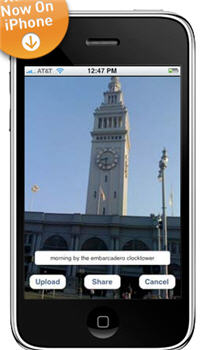
Earlier today, Myriad announced the acquisition of Xumii, a small company with offices in Silicon Valley and Sydney, Australia. Xumii’s software for mobile phones ties Twitter, Facebook, MySpace and other social network apps together into one application.
[aditude-amp id="flyingcarpet" targeting='{"env":"staging","page_type":"article","post_id":127723,"post_type":"story","post_chan":"none","tags":null,"ai":false,"category":"none","all_categories":"business,entrepreneur,mobile,social,","session":"D"}']Moreover, Xumii’s value-adding services run not on customers’ phones directly, but they are served from the cloud. For social network addicts without a smartphone powerful enough to run advanced network applications nonstop while they walk around, Xumii seems ideal. As an acquisition, it’s a smart move if Xumii can scale in the cloud (instead of a Myriad-owned data center).
You can read Myriad’s press release, but here’s the pullquote:
AI Weekly
The must-read newsletter for AI and Big Data industry written by Khari Johnson, Kyle Wiggers, and Seth Colaner.
Included with VentureBeat Insider and VentureBeat VIP memberships.
“The Xumii technology is ideal for mass-market mobile phones, which do not have sufficient processing power, battery life and memory for advanced, always-on data services. Xumii overcomes these shortfalls by moving the bulk of the processing and data storage to its servers – the cloud.”
Xumii isn’t only playing the low end of the market, though. The company recently launched an iPhone version of its application.
We wrote in June that Xumii was getting attention from wireless carriers before launching its product, although the company faced competiton from other startups such as Jibe. Xumii was one of our MobileBeat 2008 top-30 companies. By hiring all 17 Xumii employees, Myriad will absorb both Xumii’s technology.
Myriad’s real competition, though, isn’t Xumii or Jibe, it’s Motorola and Nokia. Moto’s new MOTOBLUR service proves that the world’s biggest handset makers plan to own and run Xumii-like services built into their phones. Nokia can’t seem to get traction from American smartphone buyers, but the former car tire and rubber boots manufacturer is still the world’s largest handset maker, selling nearly as many phones as Samsung, Sony Ericsson, Motorola and LG combined. Nokia execs have made it clear they want to own the services most used on their phones. Can Myriad fit into that picture?
VentureBeat's mission is to be a digital town square for technical decision-makers to gain knowledge about transformative enterprise technology and transact. Learn More
